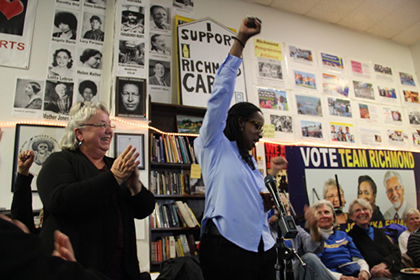from Solidarity
August 14, 2017
The last several years have seen cracks in the hegemony of bourgeois electoral politics unlike anything we’ve seen since the beginning of the neoliberal era in the late 1970s. Tens of thousands of radicalizing young people have been mobilized the campaigns of Bernie Sanders in the US, Jeremy Corbyn in the UK, and others around the world, and have swelled the ranks of organizations or caucuses like Momentum within the British Labour Party, and DSA in the US.
The contradictions of this moment will be sharply felt. Mass layers of people are discontent and want alternatives to neoliberal politics including the Clintonite Democratic Party. Many will be drawn toward progressive Democrats and Democratic Party primary challenges. Some of these efforts will likely be fruitful in the short term, but we can’t expect them to lead to anything transformative in the medium to long term, and the pressure on organizers to remain within the orbit of the Democratic Party will be immense despite the sharp criticisms many have of the party.
The Green Party has grown and been somewhat revitalized but remains marginal, with its victories limited to scattered and minor local seats. It is simply not seen as a serious alternative by the great majority of people joining the resistance, and no interventions from small socialist organizations are going to change that. Nor is the construction of a new mass party of the working class in the cards for us in the immediate future (at any rate, not through any effort of Solidarity or the forces around us).
Arguments about deprioritizing elections and building movements are similarly unlikely to be persuasive in the era of Trump and the violent incompetence of Republican dominance—and serious socialist strategy cannot forever dodge the question of elections and state power in any case.
We need an approach to electoral politics that can:
- Win meaningful victories (both in terms of winning office and of winning strategic reforms);
- Attract important layers of activists and give them an electoral vehicle that is widely seen as serious AND that remains structurally independent of the Democratic Party;
- Build organization(s) that mobilize people, bridge gaps between social movements and electoral politics, and provide a grassroots base the means by which to hold candidates and elect officials accountable.

Richmond Progressive Alliance member and Richmond councilperson Jovanka Beckles speaks, fist raised, at an RPA event, standing next to fellow RPA member and former Richmond mayor Gayle McLaughlin.
For reasons alluded to above, the conditions don’t yet exist for the creation of a new national party that meets these criteria. But the conditions do exist to make this possible on the local level. Local independent political organizations (IPOs), of which the Richmond Progressive Alliance (RPA) is probably our most successful model, have already proven useful tools for achieving all of these strategic goals. These organizations can unite people across strategic differences, from progressive Democrats to diehard third party activists (and they are not mutually exclusive with the goals of some comrades to continue building the Greens or other existing formations). Similarly, they can allow labor unions and other key forces that are unable or unwilling to fully break from the Democratic Party a way to nonetheless engage in electoral work that pressures and challenges Democrats from an independent position.
A careful outline of the parameters of these type of groups and which we would or would not support would perhaps be useful but is beyond the scope of this text. Such an outline would be further complicated by differences in state and local laws around elections, ballot lines, and so on. But broadly we should at least support efforts that do all of the following:
- Run viable candidates who may have endorsements from one or more parties, but who run formally independently from the Democratic Party;
- Accept no corporate money;
- Are rooted in social movements and grassroots organization, providing movements a vehicle to engage in elections, popularizing key demands, and gaining a foothold in local government from which to fight for them;
- Provide some mechanism(s) by which the grassroots base can determine the program of candidates, rather than just choosing which candidates to support, and hold elected officials accountable to that program;
- Build organizations which, even if primarily oriented toward elections, maintain year round activity and organize outside of just the electoral context.
Finally, a network of such local IPOs might lay the foundation for new state and national organizations/parties of the scale and level of seriousness that we need, with a grassroots base in local communities of a type difficult or impossible to achieve through calling for the wholesale creation of a new party.
This document was approved by a large majority at Solidarity’s 2017 Convention. It was co-signed by the following members of Solidarity (other organizational affiliations of each comrade listed here for reference only, and not to indicate that these organizations endorse all the ideas in this document):
Aly Baldree (Green Party of Kansas City – Kansas City, MO)
Robert Caldwell (Left Elect – Dallas/Fort Worth, TX)
Steve Early (Richmond Progressive Alliance – Richmond, CA)
Alex Fields (2017 City Council Movement – Knoxville, TN)
Matthew Luskin (United Working Families – Chicago, IL)
Joanna Misnik (Chicago Socialist Campaign – Chicago, IL)
